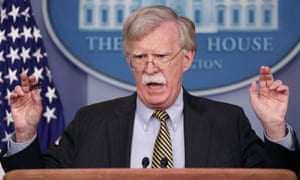Extract from The Guardian
Bolton hailed Brazilian president-elect a ‘positive sign’ as he announced new sanctions against Venezuela and Cuba
John Bolton has welcomed Brazil’s far-right president-elect Jair Bolsonaro
as a “positive sign” for Latin America as he hailed a new ally against
what Bolton called a “troika of tyranny”: Cuba, Venezuela and Nicaragua.
In a speech in Miami on Thursday, the US national security adviser announced new sanctions against Venezuela and Cuba, including a ban on US citizens taking part in trade in Venezuelan gold. Bolton also added over two dozen entities owned or controlled by the Cuban military and intelligence services to a sanctions blacklist.
Bolton was speaking a few days before midterm elections in which the diaspora from Cuba and other Latin American states represent an important part of the Florida electorate.In a speech in Miami on Thursday, the US national security adviser announced new sanctions against Venezuela and Cuba, including a ban on US citizens taking part in trade in Venezuelan gold. Bolton also added over two dozen entities owned or controlled by the Cuban military and intelligence services to a sanctions blacklist.
As the Trump administration has done in the Middle East, Bolton drew a clear line between friends and foes, and used bellicose language likely to stoke growing fears in Latin America that Washington could recruit rightwing governments in Brazil and Colombia to take military action against Venezuela.
“The recent elections of like-minded leaders in key countries, including Ivan Duque in Colombia, and last weekend Jair Bolsonaro in Brazil, are positive signs for the future of the region, and demonstrate a growing regional commitment to free-market principles, and open, transparent, and accountable governance,” Bolton said in his speech at Miami-Dade College.
“[T]oday, in this hemisphere, we are also confronted once again with the destructive forces of oppression, socialism and totalitarianism” Bolton said.
“Under this administration, we will no longer appease dictators and despots near our shores in this hemisphere. We will not reward firing squads, torturers, and murderers … The troika of tyranny in this hemisphere – Cuba, Venezuela and Nicaragua – has finally met its match.”
The collapse of the Venezuelan economy – largely as a result of the incompetence, corruption and repression of the Maduro regime – has triggered an exodus of more than 2 million people into neighbouring countries, precipitating a regional crisis.
In Nicaragua, hundreds of people have been killed in a brutal crackdown on protests against the country’s leader, Daniel Ortega. In Cuba, although Raúl Castro has stepped down as president and reforms have been announced, the island remains in the firm grip of the communist party.
He accused the three countries of being “the cause of immense human suffering, the impetus of enormous regional instability, and the genesis of a sordid cradle of communism in the western hemisphere”.
However, on the same day, the Trump administration’s relative isolation was highlighted at the UN general assembly, which overwhelmingly adopted its 27th annual resolution calling for an end to the US economic embargo on Cuba. The US mission tried unsuccessfully to amend the text of the resolution to put pressure on Cuba to improve its human rights record.
The speech was delivered among rising tensions in Latin America. Earlier this week, Colombia’s foreign minister, Carlos Holmes Trujillo, denied reports in the Brazilian press that Colombia was conspiring with Bolsonaro to use force to topple Venezuela’s leader, Nicolás Maduro. In his speech, Bolton only referred to the use of sanctions against the three governments.
Bolton’s cold war rhetoric also came at the height of a hard-fought congressional election campaign that could ultimately determine the fate of Trump’s presidency. A day before Bolton’s trip to Miami, it was reported that the administration was considering allowing Cuban Americans to use US courts to sue foreign companies which control property in Cuba seized from exiles by the government in Havana.
“This was more a ‘transparent triumvirate of electorates’ from Nicaragua, Venezuela and Cuba,” said Christopher Sabatini, a Columbia University professor and expert on the region. “It is no coincidence that this speech is being made where there are tight races for governor and for Congress. It is just another example of how our policy in the hemisphere is driven by local politics, and it’s sad.”

No comments:
Post a Comment